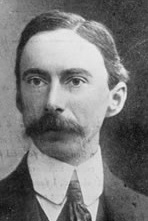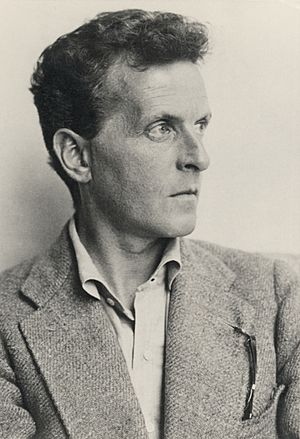Analytic philosophy facts for kids
Analytical philosophy is a way of thinking about philosophy that became very important in the 1900s. It focuses a lot on the philosophy of language, which means looking closely at how we use words and what they truly mean. It also emphasizes argumentation, which is about building strong, clear reasons for ideas.
Some of the most important thinkers in this field include Gottlob Frege, Bertrand Russell, Ludwig Wittgenstein, and Willard Van Orman Quine. They helped shape how analytical philosophy is done today.
Contents
What is Analytical Philosophy?
Analytical philosophy is a style of philosophy that became popular in the 20th century. It's different from older ways of thinking because it uses very careful and logical methods. Think of it like solving a puzzle using precise steps.
This type of philosophy tries to make ideas super clear. It breaks down big, complex problems into smaller, easier-to-understand parts. It often uses tools from logic and mathematics to help with this.
Focusing on Language
A big part of analytical philosophy is the philosophy of language. This means philosophers spend a lot of time thinking about how language works. They ask questions like:
- What do words really mean?
- How do sentences get their meaning?
- Can language sometimes trick us into thinking wrong things?
They believe that many philosophical problems come from not being clear about the words we use. By understanding language better, they hope to solve these problems.
The Power of Arguments
Another key part is argumentation. This is about making very strong and logical arguments for your ideas. In analytical philosophy, it's not enough to just have an opinion. You need to be able to explain exactly why you believe something.
This means:
- Starting with clear statements.
- Using logic to connect those statements.
- Reaching a conclusion that follows from your reasons.
It's like building a strong bridge of ideas, where each part supports the next.
Important Thinkers
Many brilliant minds helped create and develop analytical philosophy. Here are a few of the most famous ones:
Gottlob Frege
Gottlob Frege (1848–1925) was a German mathematician and philosopher. He is often called the "father of analytical philosophy." He worked a lot on logic and the philosophy of language. Frege wanted to make logic as precise as mathematics. His ideas about how language works and how we can use logic to understand it were very important for future philosophers.
Bertrand Russell
Bertrand Russell (1872–1970) was a British philosopher, mathematician, and writer. He was a very influential thinker in the 20th century. Russell worked with Frege's ideas and helped make them more widely known. He also wrote a lot about logic, mathematics, and how we know things. He believed that philosophy should be based on clear thinking and scientific methods.
Ludwig Wittgenstein
Ludwig Wittgenstein (1889–1951) was an Austrian-born British philosopher. He wrote two very famous books that changed philosophy. In his early work, he tried to show how language connects to the world. Later, he explored how language is used in everyday life. He thought that many philosophical problems come from misunderstanding how our language works.
Willard Van Orman Quine
Willard Van Orman Quine (1908–2004) was an American philosopher and logician. He was very important in the later part of the 20th century. Quine challenged some of the earlier ideas in analytical philosophy. He argued that our beliefs form a big web, and we can't test each belief on its own. His work influenced how philosophers think about knowledge and meaning.
See also
 In Spanish: Filosofía analítica para niños
In Spanish: Filosofía analítica para niños
 | Roy Wilkins |
 | John Lewis |
 | Linda Carol Brown |



